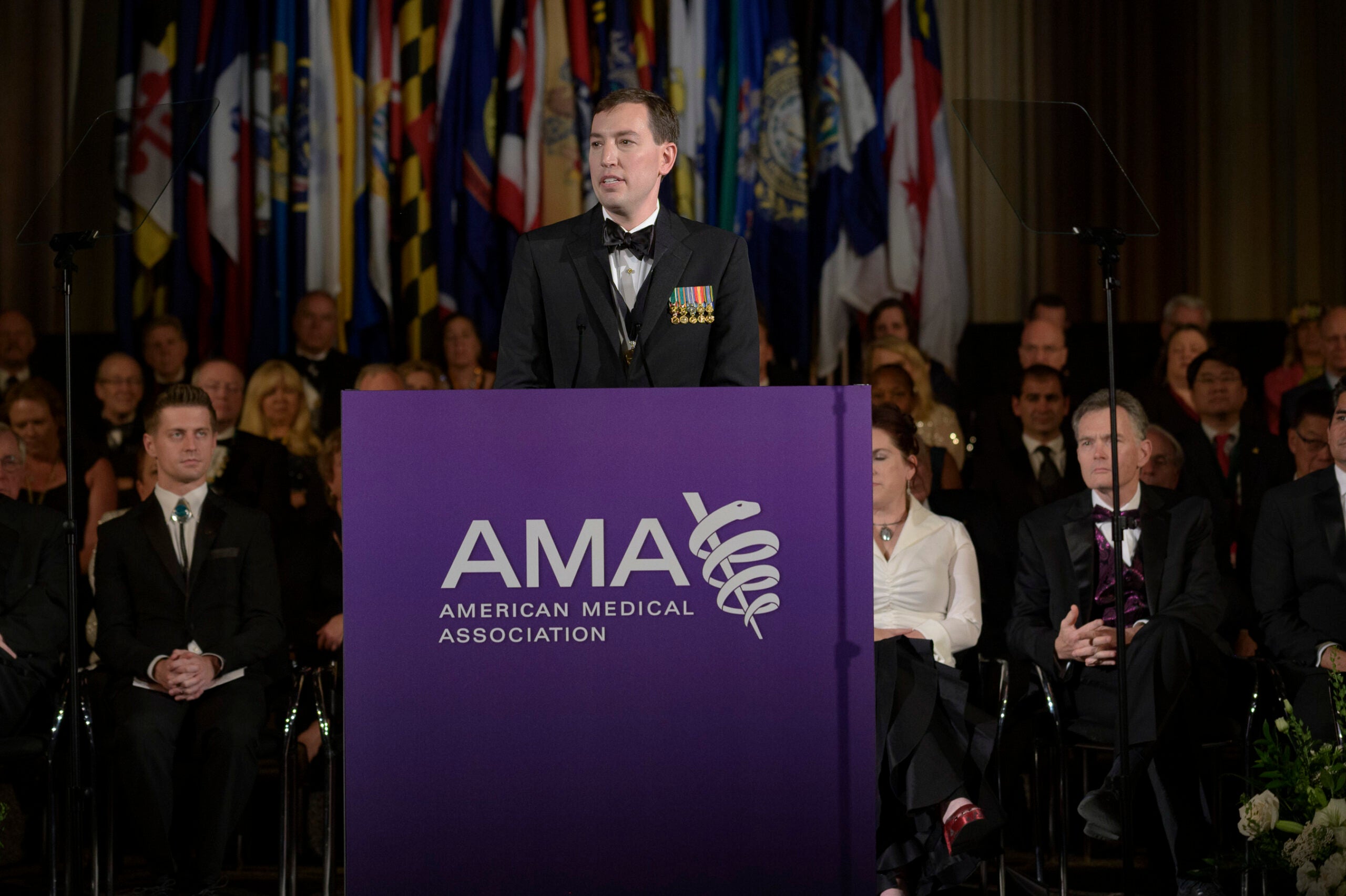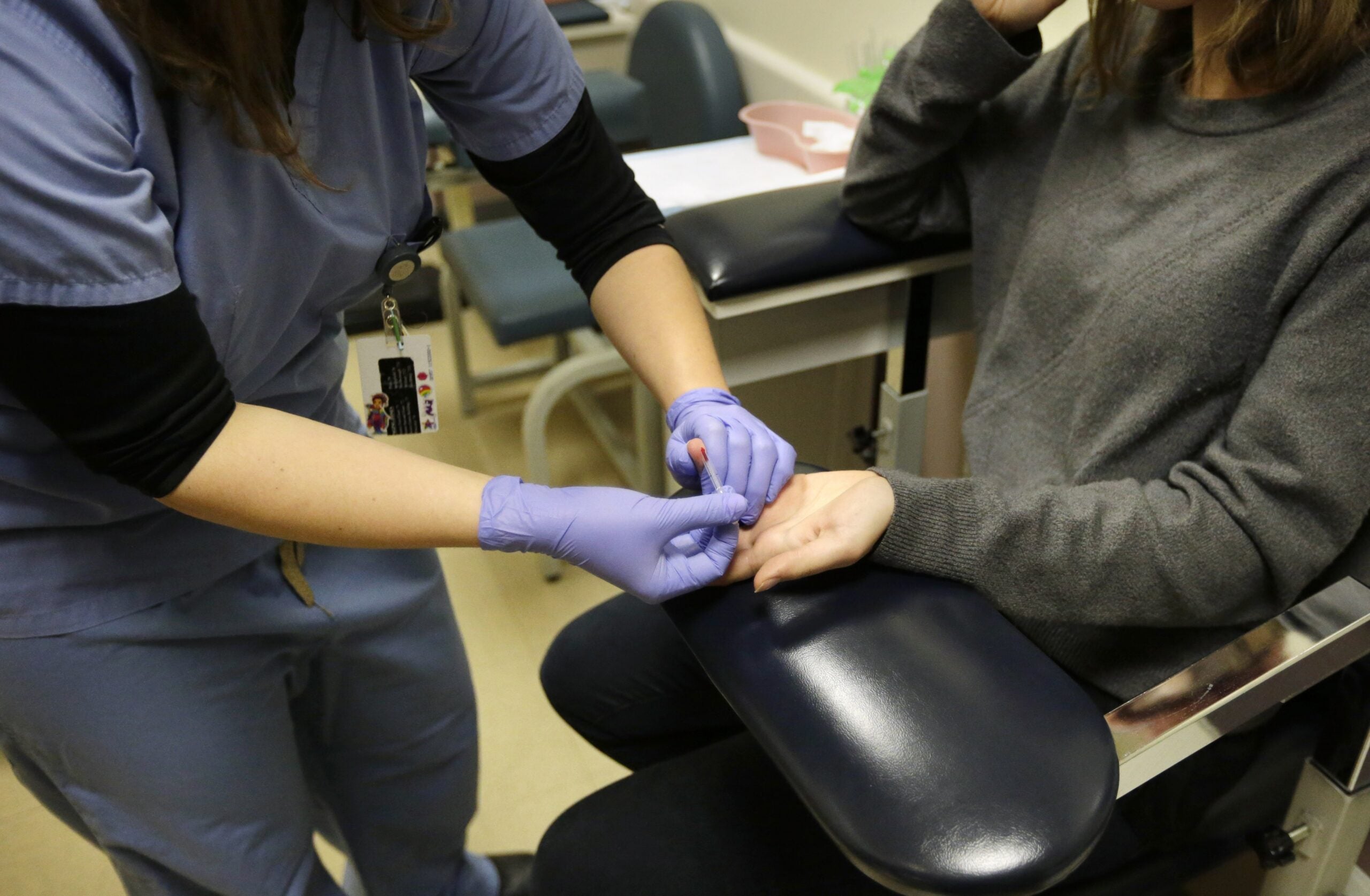As an anesthesiologist at Froedtert Hospital in Milwaukee, Dr. Jesse Ehrenfeld helped give thousands of units of blood to hundreds of patients.
But in 2019, he couldn’t give blood to his newborn son. Neither could his husband.
The couple’s son, Ethan, was born 10 weeks early and weighed 2 pounds, 7 ounces. Ethan spent 49 days in the neonatal intensive care unit at an Illinois hospital. When he was a few weeks old, Ethan needed a blood transfusion.
News with a little more humanity
WPR’s “Wisconsin Today” newsletter keeps you connected to the state you love without feeling overwhelmed. No paywall. No agenda. No corporate filter.
Because Ehrenfeld and his husband, Judd Taback, are gay, they were legally barred at the time from donating blood.
“As new parents, seeing your child struggle is unimaginable,” he said. “In those kinds of moments, all you want to do is anything possible (and) give anything you can to help your child’s recovery.”
Ehrenfeld shared this story during his inaugural address as president of the American Medical Association this summer. While Ethan was ultimately able to get the blood transfusion, Ehrenfeld said he continued feeling helpless.
During a recent appearance on Wisconsin Public Radio’s “The Morning Show,” Ehrenfeld listed tackling inequities and discrimination in health care among his priorities in his new role as president of the country’s largest physicians’ group.
The Food and Drug Administration in May changed its rules to allow for more gay and bisexual men to donate blood. Ehrenfeld has other policies in his sights, however. A teacher at the Medical College of Wisconsin, he vowed to push back against legislators trying to enact bans on gender-affirming care and abortion.
The following interview was edited for brevity and clarity.
Kate Archer Kent: What are your priorities as the American Medical Association’s new president?

Dr. Jesse Ehrenfeld: In America today and in Wisconsin after three really long years of dealing with the pandemic, people are burnt out in a lot of jobs but especially those of us who work in health care. We’ve had this “twindemic,” a COVID-19 pandemic and a pandemic of bad information. Doctors, nurses — we’ve got a really important job and that’s to keep people healthy. But we’ve got a health care system in crisis. So, in my term as AMA president, I’m working to help physicians recover from all of this.
I’m continuing to help the AMA lead our charge to make sure that we can reform Medicare payments to physicians, improve telehealth access and reduce stigma around mental health care and burnout. I’m excited about trying to drive these changes, trying to improve the health for everybody in the U.S., everybody in Wisconsin (and) particularly those who have been historically marginalized. I’ll tell you, issues of health equity (and) of LGBTQ health are close to my heart, have long been a focus of my work in medicine and are an important part of my work in the year ahead.
KAK: In your inaugural speech, you describe American medicine being under threat from legislative overreach. What is wrong with lawmakers setting greater limits on the power of doctors?
JE: Unfortunately, you’ve got people who don’t really understand health care using political wedge issues to interfere with the practice of medicine. Ultimately, decisions should be between a patient, their physician and their care team. Unfortunately, we continue to see in many states (that) legislators come in and just decide (they are) going to make it illegal for evidence-based appropriate care to occur.
This is mostly happening in issues around women’s reproductive health (and) abortion access, but also it’s happening increasingly around gender-affirming care. We strongly oppose any state law that allows for discrimination.
KAK: You also talked about your son, Ethan, in your inaugural speech. He was born 10 weeks early and underweight. What do you want people to take away about his time in intensive care?
JE: We have an American health care system that is incredibly sophisticated (and) can provide lifesaving care, but that care is unequal. We had access to some of the nation’s best doctors, the most incredible care. Our son, who was born at 29 weeks (and) just over 2 pounds, just went off to summer camp this morning. He is going to have a great day in the pool and doing all the things that you would expect a 4-year-old to do.
But unfortunately, there are too many families that just aren’t able to access that kind of high quality, sophisticated care. Or if they can, it’ll bankrupt them. Those inequities in health care access are unacceptable and a big part of our work at the AMA to make sure that everybody in America has access to the same high quality, effective care.

KAK: Ethan needed a blood transfusion. You and your husband wanted to donate. How did that unfold?
JE: Since the 1980s, there was a ban on the donation of blood by gay men that came out of the initial part of the AIDS crisis. But as science has changed (and) as testing for infectious diseases has changed, that policy no longer made sense. It hasn’t made sense for decades.
For more than 10 years, the AMA has been advocating to eliminate the wholesale ban on gay men like my husband and I from donating blood. We were not able to donate blood, obviously, when Ethan was born in 2019. But because of advocacy from the AMA and others, that policy finally just was changed this spring, making it possible for a more appropriate, evidence-based equitable policy to take effect across the nation.
KAK: You are the first openly gay person to serve as president of the AMA. What does this leadership role mean to you?
JE: Somebody listening today in Wisconsin (and) hearing us is struggling because they happen to be gay or identify as LGBTQ. I can only hope that the visibility that I bring through my leadership of the AMA — the nation’s oldest, largest, most influential physician group — can give that listener some hope, some sense of possibility.
I want to make sure that all patients everywhere can get the health care they need. But that’s only going to be possible if physicians and patients are able to make decisions themselves without the interference of lawmakers telling us how to do our jobs and second guessing the science behind medicine.
Wisconsin Public Radio, © Copyright 2025, Board of Regents of the University of Wisconsin System and Wisconsin Educational Communications Board.






